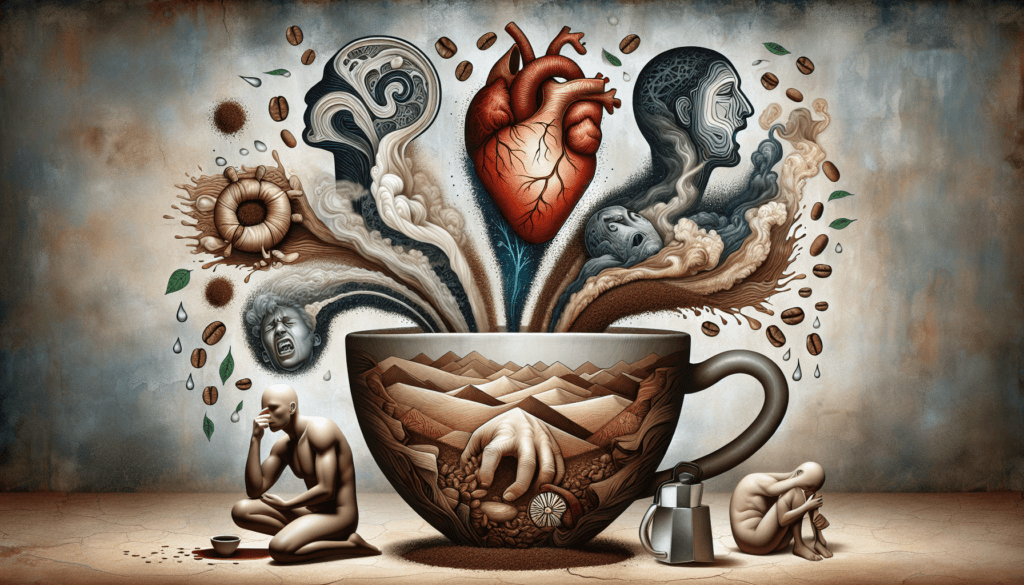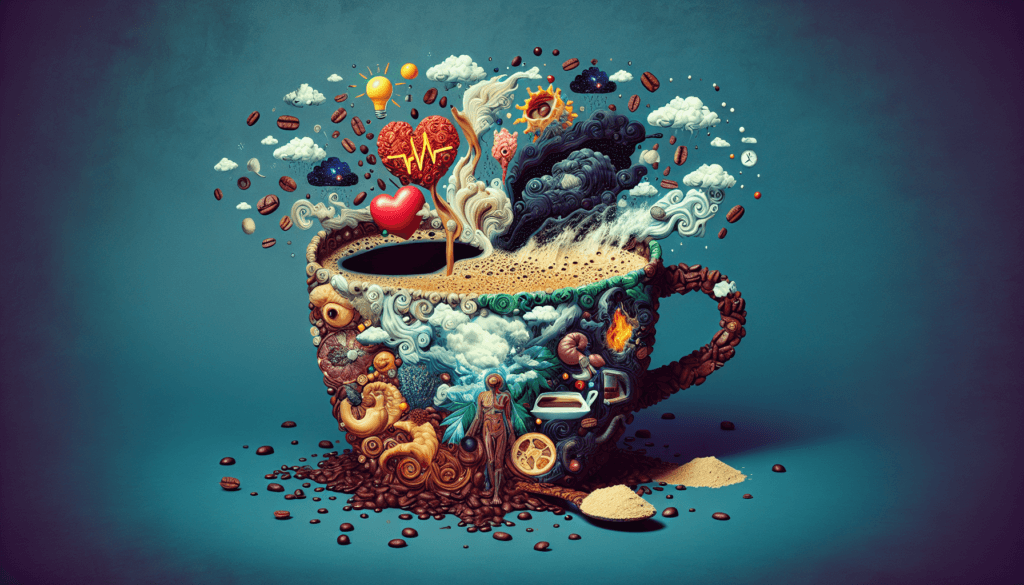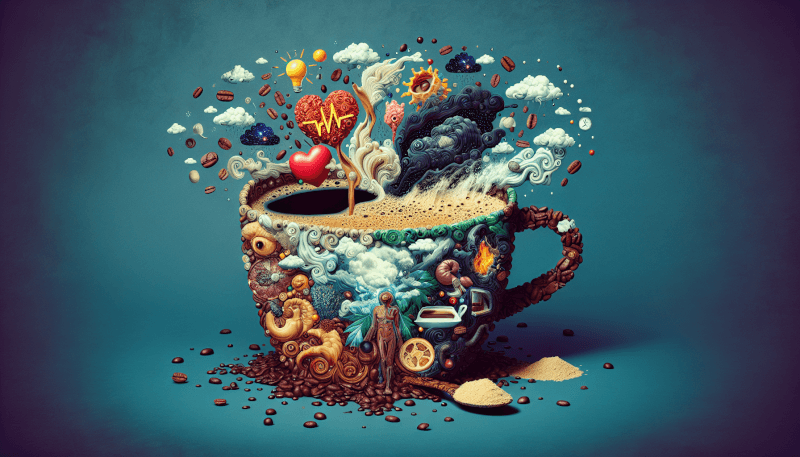Are you a coffee enthusiast who can’t function without a strong cup of joe every morning? While coffee can provide a much-needed energy boost, have you ever wondered about the potential effects of consuming too much caffeine? In this article, we will explore the impact that excessive coffee consumption can have on your body. From increased heart rate and blood pressure to disrupted sleep patterns and digestive issues, you may be surprised by the ways in which your daily coffee habit can affect your overall health. So, grab your favorite mug and join us as we explore the potential consequences of indulging in too much of that beloved brew.
Potential Negative Effects on the Nervous System
Increased Anxiety and Restlessness
Drinking excessive amounts of coffee on a daily basis can have a significant impact on your nervous system. One of the potential negative effects of consuming too much coffee is increased anxiety and restlessness. Coffee contains caffeine, a stimulant that can increase your heart rate and stimulate your central nervous system. This can lead to feelings of anxiety and restlessness, making it difficult for you to relax and unwind.
Sleep Disturbances and Insomnia
Another potential negative effect of consuming excessive amounts of coffee is sleep disturbances and insomnia. Caffeine is a known sleep disruptor, as it blocks the effects of adenosine, a neurotransmitter responsible for making you feel tired and sleepy. By interfering with the natural sleep-wake cycle, coffee can make it harder for you to fall asleep and stay asleep. This can lead to insomnia and leave you feeling groggy and fatigued the next day.
Dependency and Withdrawal Symptoms
Regular, high consumption of coffee can also lead to dependency and withdrawal symptoms. The more coffee you drink, the more your body becomes accustomed to the effects of caffeine. Over time, you may find that you need larger amounts of coffee to achieve the same level of alertness and energy. This can result in physical and psychological dependency on caffeine. If you try to cut back or quit coffee, you may experience withdrawal symptoms such as headaches, fatigue, irritability, and difficulty concentrating.
Impact on Digestive System and Bowel Movements
Stomach Irritation and Acid Reflux
Drinking excessive coffee can also have negative effects on your digestive system. Coffee is acidic in nature and can irritate the lining of your stomach, leading to discomfort and potentially causing acid reflux. If you already suffer from conditions like gastritis or gastroesophageal reflux disease (GERD), consuming too much coffee can exacerbate your symptoms and further irritate your digestive system.
Diarrhea and Dehydration
Coffee is a natural diuretic, which means it increases urine production and can lead to dehydration. When you consume too much coffee, your body excretes more fluids, potentially leaving you dehydrated if you do not adequately replenish your hydration levels. Additionally, the caffeine in coffee can stimulate the muscles in your digestive system, causing them to contract more frequently. This can result in loose stools and even diarrhea for some individuals.

Influence on Cardiovascular Health
Increased Heart Rate and Blood Pressure
One of the immediate effects of consuming large amounts of coffee is an increase in heart rate and blood pressure. As a stimulant, caffeine stimulates your central nervous system, which triggers the release of adrenaline. This adrenaline surge can cause your heart to beat faster and your blood vessels to constrict, leading to elevated heart rate and blood pressure levels. While this increase may be temporary, regularly exposing your cardiovascular system to this spike in activity can have long-term consequences.
Risk of Heart Disease
Studies have shown that excessive coffee consumption may be associated with an increased risk of heart disease. The effects of caffeine on heart rate and blood pressure, as well as other compounds found in coffee like diterpenes, can contribute to the development of cardiovascular problems. Although the relationship between coffee and heart disease is complex and can vary depending on individual factors, it is important to be mindful of the potential risks, especially if you have pre-existing heart conditions.
Possibility of Abnormal Heart Rhythms
Drinking too much coffee can also potentially lead to abnormal heart rhythms, known as arrhythmias. Caffeine can interfere with the natural electrical signals in your heart, causing irregular heartbeats or palpitations. While for most people this is harmless and resolves on its own, in some cases, it can be a cause for concern. If you have a history of heart arrhythmias or other cardiac disorders, it is advisable to limit or avoid excessive coffee consumption.
Effect on the Endocrine System
Adrenaline Release and Stress Response
Coffee’s stimulant effects on the nervous system can also impact the endocrine system, particularly the release of adrenaline. As mentioned earlier, caffeine triggers the release of adrenaline, which initiates the body’s stress response. While this can provide a temporary boost in energy and alertness, constantly stimulating the release of adrenaline can put unnecessary stress on your endocrine system.
Disruption of Hormonal Balance
Your endocrine system is responsible for regulating the hormones in your body. Excessive coffee consumption can disrupt this delicate hormonal balance. Caffeine can interfere with the production and absorption of certain hormones, such as cortisol, which plays a crucial role in regulating stress levels. Disruptions in hormonal balance can have wide-ranging effects on various bodily functions and may contribute to hormonal imbalances, mood swings, and other health complications.

Impact on Sleep Patterns and Circadian Rhythm
Delayed Sleep Onset
Drinking coffee, especially in the later hours of the day, can disrupt your sleep patterns and delay your sleep onset. The stimulating effects of caffeine can make it harder for you to fall asleep when you want to. It is recommended to avoid consuming coffee at least six hours before bedtime to allow your body enough time to metabolize the caffeine and prepare for sleep.
Impaired Quality of Sleep
Consuming excessive amounts of coffee can also impair the quality of your sleep, even if you manage to fall asleep. Caffeine can shorten your total sleep time, disrupt the natural sleep stages, and reduce the amount of deep, restorative sleep you experience. This can leave you feeling tired and groggy even after a seemingly long night of sleep, affecting your overall well-being and cognitive function.
Disrupted Circadian Rhythm
Your body has an internal clock known as the circadian rhythm, which helps regulate your sleep-wake cycle. Regularly consuming large amounts of coffee can disrupt this natural rhythm, making it harder for your body to establish a consistent sleep pattern. Disrupted circadian rhythms can lead to sleep disorders, fatigue, and difficulty maintaining a healthy daily routine.
Influence on Nutrient Absorption
Interference with Calcium and Iron Absorption
Coffee contains compounds called tannins, which can inhibit the absorption of certain nutrients like calcium and iron. When consumed in excess, coffee can interfere with the body’s ability to absorb these essential minerals, potentially leading to deficiencies. This is particularly relevant for individuals who rely heavily on coffee as their main source of hydration, as it may hinder their ability to obtain adequate amounts of calcium and iron from their diet.

Effect on the Liver
Impaired Liver Function
There is evidence to suggest that excessive coffee consumption may negatively impact liver function. While moderate coffee consumption has been associated with a lower risk of liver diseases like liver cancer and cirrhosis, excessive amounts of coffee can burden the liver and lead to impaired liver function. The caffeine and other compounds in coffee can increase liver enzyme levels, disrupt the liver’s metabolic processes, and potentially contribute to liver damage over time.
Consequences for Mental Health
Heightened Anxiety and Panic Disorders
The combination of caffeine’s stimulating effects and its impact on the nervous system can have consequences for mental health. Drinking too much coffee on a regular basis can contribute to heightened anxiety and may even trigger panic attacks in susceptible individuals. The increased heart rate, racing thoughts, and restlessness associated with excessive coffee consumption can exacerbate existing anxiety disorders or lead to new onset mental health issues.
Increased Risk of Depression
While moderate coffee consumption has been associated with a lower risk of depression, excessive coffee intake may have the opposite effect. Caffeine can interfere with neurotransmitters like serotonin and dopamine, which play a crucial role in regulating mood. Disruptions in these neurotransmitters caused by excessive coffee consumption can potentially increase the risk of developing depressive symptoms and other mood disorders.

Impact on Bone Health
Possible Decrease in Bone Density
Coffee contains compounds that interfere with the body’s ability to absorb calcium, an essential mineral for maintaining healthy bones. When consumed excessively, coffee can potentially contribute to a decrease in bone density, leading to conditions like osteoporosis and an increased risk of fractures. It is important to balance your coffee consumption with a diet rich in calcium and engage in weight-bearing exercises to support strong and healthy bones.
Influence on Dental Health
Stained Teeth and Bad Breath
One of the more visible effects of excessive coffee consumption on your body is its impact on dental health. Coffee, especially when consumed without moderation, can stain your teeth, leaving them discolored and dull. The dark pigments found in coffee can cling to the enamel, gradually causing stains that may be difficult to remove. Additionally, the acidic nature of coffee can contribute to bad breath, as it creates an environment in which bacteria thrive, leading to unpleasant mouth odor.
In conclusion, while enjoying a cup of coffee now and then can be a pleasurable experience, drinking excessive amounts on a daily basis can have negative effects on various systems and functions within your body. From the nervous system to cardiovascular health, the endocrine system to bone health, the implications of excessive coffee consumption can be far-reaching. It is important to be mindful of your coffee intake and consider potential moderation to maintain a healthy body and mind.



